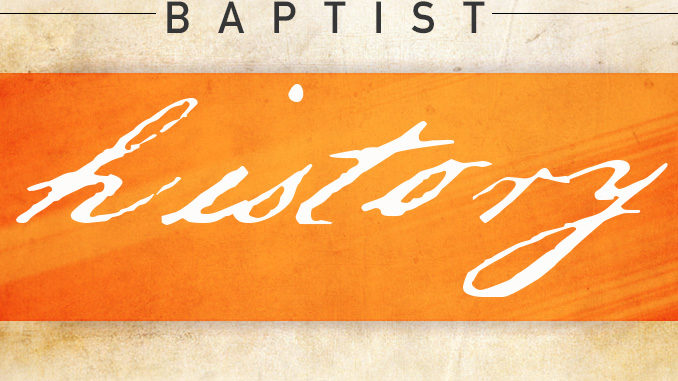
In February 2007, I visited the village of Moulton in the English Midlands, about an hour north of London. There is no great cathedral there, nor was it the site of a famous battle. It is not a seat of learning and has no natural wonders to ll the visitor’s gaze. But some remarkable events did occur here – not as the world would view them, but as a Christian would – in the 1780s.
From 1785 to 1789, the small and struggling Baptist church near the village’s edge was led by a rather short, virtually bald, just in his mid-20s, pastor who had no formal college or university training. He struggled to provide for a growing family on a meager salary, which he supplemented by working with leather cobbling shoes, and running a very small school. Though born and raised in obscurity in a nearby village, this young man had been touched by God. Because of his conviction that the Bible required that baptism be only for believers and only by immersion, he associated himself with the Baptists. That young man was William Carey (1761-1834).
Carey was an avid reader of books by Captain Cook who on his various sea voyages discovered new lands with strange animals, geologic wonders, and new people who spoke unrecorded languages. Most importantly from Carey’s perspective, they neither knew God nor had the knowledge of the Gospel. As Carey read his Bible, and read Cook, he came to understand his personal responsibility to do all he could to take the Gospel message to these still in darkness. Carey made his own paper wall map of the world, and as each new land and people came to his knowledge, he added to his map the location and the total numbers of souls, recording their spiritual state – “Romanists” and more often “pagans.”
As he worked, he prayed fervently over the map, and his burden grew more intense. As he instructed his handful of pupils about world geography, he wept over the peoples of these lands, noting their multitudes and lamenting, “and they are pagans! Pagans!” And he studied languages – Latin, Greek, Hebrew, French, Dutch, and more. Without a teacher, without assistance, without much encouragement he labored in the languages. He was a man driven.
Carey sought to instill in other Baptist pastors’ hearts the burden that God had laid on his own soul, but he was met with cold discouragement. Some, on the basis of certain theological presuppositions, dismissed his calls for action as unnecessary since God in His sovereignty would tend to the matter. Others dismissed the task as too large and too idealistic, and besides, who were they to undertake it? But Carey would not let the matter rest. After repeated rebuffs, finally, a Baptist missionary society was formed in 1792. Now if they could just find some missionaries to send! Carey proposed himself, and sailed for India, where he exhausted himself in 31 years of continuous labors for the Gospel’s sake, and in the process, became recognized as the world’s greatest linguist of that era. But back to Moulton.
The Baptist church in Moulton persists to this hour. The present structure yet includes some walls which existed in Carey’s day, with later additions and alterations. And nearby is the parsonage, the stone street-facing row house where Carey and his family lived; along one side is the room, perhaps not more than 15 by 7 feet, with a low ceiling, where Carey cobbled, instructed his charges, and prayed. The water trough where Carey soaked his leather before working it is still there, white-washed. The open beams of the ceiling are present — many a devout heart-cry of intercession rose past these beams from Carey’s lips to the ear of God, as Carey wept over the pagans of this world. Carey’s workbench, some period leather tools and leather scraps found beneath the house’s oorboards, his pulpit, and the church minute book, with Carey’s notes in a beautiful and highly legible hand, are on display here, along with other memorabilia of this life which, under God, transformed forever the spiritual landscape of this world.
An obscure and outwardly unimpressive cobbler, without formal training, without money or in uence in the world, and even viewed by his closest ministerial colleagues as an unrealistic visionary, such was young William Carey. Yet he prayed and listened to the voice of God. In this small, narrow room, which did triple duty as a cobbler’s shop, a school room, and a pastor’s prayer closet, William Carey prayed, and prayed with intensity and fervency, and see what God did! Here
For those who wish to read about Carey, his life, and labors, I very highly recommend William Carey by Samuel Pearce Carey.
